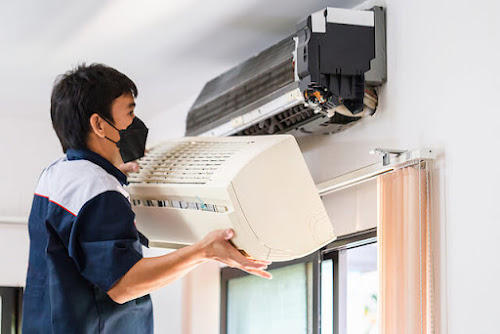How to Properly Ventilate Your Home with Your AC System?
Introduction
Proper ventilation is essential for maintaining a
comfortable and healthy living environment. One of the key components in
achieving good ventilation is your AC system. In this article, we will explore
the various ways to properly ventilate your home using your AC system. Whether
you're looking to improve air circulation, reduce humidity, or enhance indoor
air quality, we've got you covered. Let's dive in!
How Does Ventilation
Work?
Ventilation refers to the process of exchanging indoor air
with fresh outdoor air. It helps remove stale air, pollutants, and excess
moisture, while also providing necessary oxygen for breathing. Your AC system
plays a crucial role in this process, as it circulates and filters the air in
your home. Understanding how ventilation works will enable you to optimize your
AC system for better airflow and ventilation.
1. Clean and Maintain
Your AC Filters Regularly
Regular maintenance of your AC filters is vital for proper ventilation. Clogged filters restrict airflow and reduce the efficiency of your system. To maintain optimal ventilation, follow these steps:
- Turn off your AC system.
- Locate the air filters, usually found behind a removable panel on the indoor unit.
- Remove the filters and clean them using a vacuum cleaner or rinse with water if reusable.
- Allow the filters to dry completely before reinstalling them.
- If the filters are damaged or heavily soiled, replace them with new ones.
Regularly cleaning or replacing your AC filters not only
ensures proper ventilation but also improves the overall air quality in your
home.
2. Use Exhaust Fans
in Moist Areas
Moisture accumulation in areas like the kitchen, bathroom,
and laundry room can lead to mold growth and unpleasant odors. To prevent this,
make sure to use exhaust fans in these areas. Exhaust fans help remove
moisture, steam, and odors from the air, promoting better ventilation.
Install exhaust fans in the following areas:
- Kitchen: Above the stove or cooktop to remove cooking fumes and steam.
- Bathroom: Near the shower or bathtub to eliminate moisture and odors.
- Laundry Room: Ventilate the room by installing an exhaust fan near the dryer.
Using exhaust fans in these moisture-prone areas will
significantly improve the overall ventilation in your home.
3. Open Windows and
Doors Strategically
Opening windows and doors strategically can facilitate natural ventilation and improve indoor air quality. Here are some tips to maximize the benefits:
- Cross Ventilation: Open windows on opposite sides of a room to create a flow of fresh air.
- Time of Day: Open windows early in the morning or late at night when outdoor temperatures are cooler.
- Security Considerations: Use window screens and door stoppers to ensure safety while allowing air circulation.
- Outdoor Conditions: Avoid opening windows during periods of high pollution or allergen presence.
By strategically opening windows and doors, you can enhance
the ventilation in your home while enjoying the benefits of fresh air.
4. Consider
Installing a Whole-House Ventilation System
If you want to take ventilation to the next level, consider
installing a whole-house ventilation system. This system works in conjunction
with your AC system to provide continuous fresh air throughout your home. Here
are the two most common types of whole-house ventilation systems:
Heat Recovery
Ventilator (HRV): HRVs transfer heat between incoming and outgoing air,
reducing energy loss while providing fresh air. These systems are ideal for
colder climates.
Energy Recovery
Ventilator (ERV): ERVs not only transfer heat but also moisture, helping to
maintain proper humidity levels in your home. ERVs are suitable for warmer and
humid climates.
Consult a professional HVAC technician to determine which
type of whole-house ventilation system is best for your home. Contact Wtfixair for any air conditioner installation in Melbourne.

Comments
Post a Comment